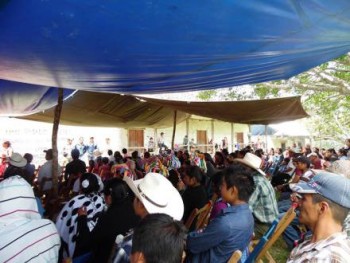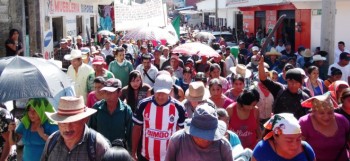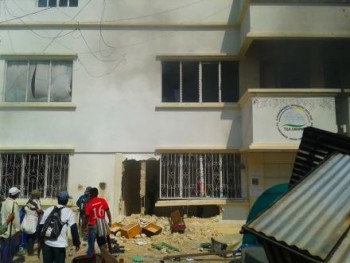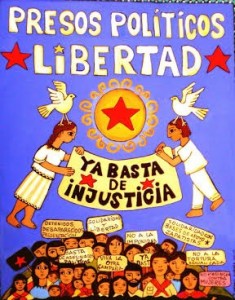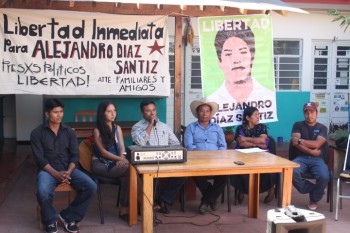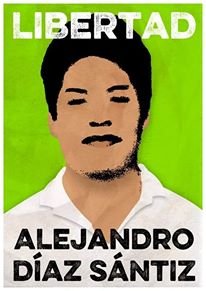
Topics
(Español) CNI se pronuncia sobre el Ejido Tila y la tormenta que se avecina
A los Pueblos, Naciones, Tribus y Barrios que integran el Congreso Nacional Indígena;
A la Sexta Nacional e Internacional
A los pueblos de México y el Mundo
Frente a la tormenta que se avecina
Este 16 de diciembre nuestros hermanas y hermanos del pueblo ch’ol del Ejido Tila, en la Zona Norte de Chiapas, por acuerdo de su asamblea general decidieron recuperar su autonomía ejidal y expulsar al Ayuntamiento Municipal de Tila de su territorio. El motivo es el daño que ha causado al ejido en su intento de despojo del poblado de Tila para controlarlo y privatizarlo, de írselos arrebatando a quienes por derecho legítimo, ancestral y ejidal les pertenece; los hombres, mujeres, ancianas, ancianos, jóvenes, niñas y niños ch’oles que lo habitan, trabajan y defienden.
Las hermanas y hermanos ch’oles del Ejido Tila han sido insistentes en denunciar y señalar la historia de desprecio, represión y despojo a la que se han enfrentado por parte del ayuntamiento y el gobierno del estado. Buscan cambiar el régimen colectivo de la tierra del poblado de Tila, que es el corazón del territorio ejidal, para imponer la forma de vida capitalista y paramilitar, porque es controlado por Paz y Justicia, grupo paramilitar.
Este Ayuntamiento de Tila controlado por paramilitares, además del mal gobierno estatal y federal tienen una gran deuda pendiente de Justicia no sólo frente al ejido, sino al pueblo ch’ol y la humidad, por la muerte que han generado con la contrainsurgencia paramilitar en esta región, que se suma a la gran deuda que estos malos gobiernos tienen con los pueblos de México.
El pueblo ch’ol del Ejido Tila, como lo están haciendo otros pueblos, tomó su propia determinación de recuperar lo que por derecho les corresponde. Por eso hacemos un llamado a todos los compañeros y compañeras a solidarizarse con esta acción realizada por parte de nuestros hermanos y hermanas ch’oles para recuperar su autonomía ejidal.
Les pedimos estar atentos frente a la respuesta de los malos gobiernos y sus fuerzas represivas que en esta región están compuestas por militares, policías y paramilitares, que han estado movilizando públicamente en los últimos meses, como lo han denunciado anteriormente las y los hermanos del Ejido Tila.
Exigimos el respeto a la autonomía del pueblo ch’ol de Tila, como seguiremos exigiendo el respeto al territorio y autonomía de los pueblos de México, que la Hidra Capitalista quiere arrebatarnos.
POR LA RECONSTITUCIÓN INTEGRAL DE NUESTROS PUEBLOS
NUNCA MÁS UN MÉXICO SIN NOSOTROS
CONGRESO NACIONAL INDÍGENA
(Español) San Isidro los Laureles recupera tierras que trabajaron sus padres y abuelos, como “peones acasillados”.
Entrevista a miembro de San Isidro los Laureles sobre la recuperación de tierras:
[podcast]https://radiozapatista.org/Audios/TomaDeTierras-sanIsidroLosLaureles.mp3[/podcast]
Sobre el trabajo como cortadores de caña:
[podcast]https://radiozapatista.org/Audios/CortadoresDeCaa-SanIsidroLosLaureles.mp3[/podcast]
Primer pronunciamiento
Decidimos recuperar la tierra.
San Isidro Los Laureles, municipio de Venustiano Carranza, Chiapas.
A las organizaciones autónomas de México
A las organizaciones nacionales e internacionales
A los compañeros, compañeras adherentes a la Sexta Declaración de la Selva Lacandona
A los compañeros del EZLN
Al Congreso Nacional Indigena
El Día 20 de diciembre del 2015, a las 11 am, decidimos recuperar los ranchos de los que dicen ser propietarios, Francisco Ruiz, Rodrigo Ruiz, Octavin Albores, que es el municipio de Venustiano Carranza, Chiapas.
Porque estas tierras las trabajaron nuestros abuelos, abuelas, padres que eran peones acasillados. Desde el año 1940 han trabajado con un sueldo mínimo, nunca les han dado prestaciones y aguinaldos. Por nuestras familias, porque ya no tenemos donde vivir o trabajar para el sustento de las familias como indígenas, recuperamos las tierras.
Pedimos que se solidaricen las demás organizaciones autónomas de México y otras instancias con nuestra lucha justa, de donde vivir, donde trabajar, para el sustento de nuestras familias.
Un revolucionario, si no actúa con dignidad, no es revolucionario.
San Isidro los Laureles, integrante de la organización Semilla Digna, Adherentes a la Sexta Declaración de la Selva Lacandona del EZLN.

